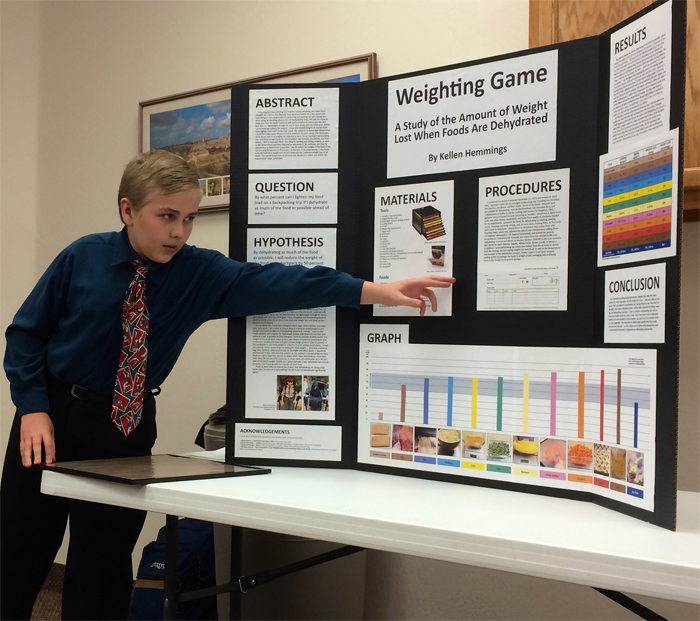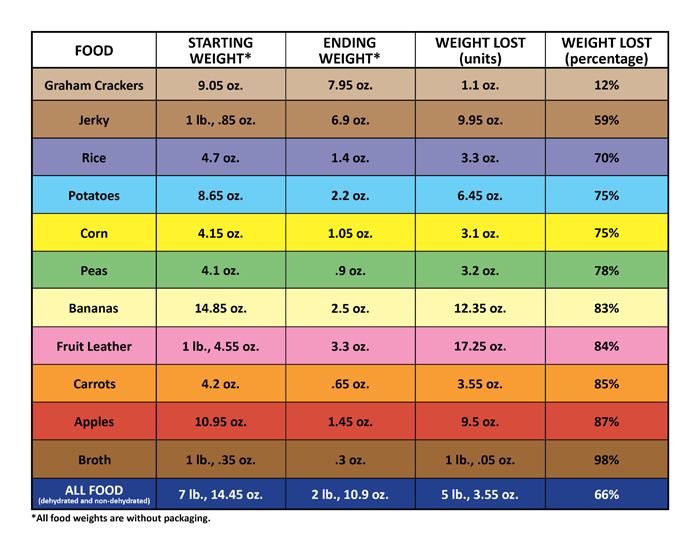
Note: My son Kellen is guest posting in my place, sharing the findings from his recent science-fair project, for which he consulted the GNOWFGLINS Dehydrating eBook and followed lessons and instructions from the GNOWFGLINS Dehydrating eCourse. –Sonya
As a Boy Scout with food allergies, I am responsible for preparing and packing my own allergy-free foods to take on hiking, camping, and backpacking trips. On backpacking trips, not only do I have to make sure that the foods I pack are safe and nutritious for me to eat, but also that they are lightweight enough for me to carry along with all of the other gear I need. Preparing and dehydrating foods in advance would allow me to carry more food that weighs less and takes up less space in my backpack.
For my whole life, I have been allergic to dairy, eggs, wheat/gluten, and most nuts. As a result, I am unable to simply shop at a store for prepackaged or processed food items to take on a backpacking adventure. Instead, I have to plan meals carefully and prepare my food ahead of time with balanced nutrition and safety in mind.
In addition to food allergies, I have to consider another factor: the weight of the foods that I need to carry. Boy Scouts of America recommends that a backpack, loaded with food and gear, should weigh no more than 25 percent of the backpacker’s own body weight in order for it to be carried comfortably. I weigh 102 pounds, which means that my backpack’s total weight — including a sleeping bag, tent, clothing, toiletries/first-aid kit, flashlight and other items — should be 25.5 pounds or less.
One possible solution to this problem is to dehydrate as many foods as I can so that they are not as heavy while I hike. Dehydrating a food item takes away 98 percent of its moisture. In some cases, this eliminates up to 90 percent of the item’s weight. Apples are a great example: If you dehydrate two pounds of apples, you’ll end up with four ounces of dried fruit.
This is my science fair project.
Weighting Game: A Study of the Amount of Weight Lost When Foods are Dehydrated
I hope to show with my science fair project that dehydrating the allergy-free foods I plan to carry on a backpacking trip will make my overall load significantly lighter.
Question/Hypothesis
Specifically, I want to know:
By what percent can I lighten my food load on a backpacking trip if I dehydrate as much of the food as possible ahead of time?
My estimate is that:
By dehydrating as much of the food as possible, I will reduce the weight of the food in my backpack by 50 percent to 75 percent.
Procedures
I conducted my research between November 11, 2013, and January 4, 2014.
First, I planned a menu for an overnight backpacking trip, including one breakfast, two lunches, one dinner, and four snacks. (Some of the foods I selected were not suitable for dehydrating, such as marshmallows, two chocolate bars, and 3 tablespoons of butter to use for cooking hash browns for breakfast.)
Next, I gathered and purchased the tools (including an Excalibur dehydrator, a digital food scale, and other kitchen equipment) and foods (from apples to potatoes) needed for my experiments.
Then I prepared the foods for dehydrating by washing, peeling, slicing, chopping, pureeing, mixing, and, in some cases, cooking them. As the foods were ready to dehydrate, I placed them on dehydrator trays (some lined with ParaFlexx liners, some not), adjusted the dehydrator’s temperature setting (from 115 degrees Fahrenheit to 155 degrees Fahrenheit), and started the process.
For guidance, I followed print materials and videos from the GNOWFGLINS.com Dehydrating eCourse and eBook, by Wardee Harmon. In addition, I used dehydrating log sheets from the eCourse to record both the starting and and ending weights for each food, as well as the temperature and duration of the dehydration process.
Finally, I used a Food Saver vacuum-sealing system to package the foods in airtight plastic packaging before placing them in the freezer for long-term storage.
 Results
Results
My original estimate was that by dehydrating as much food as possible, I would reduce the weight of the food in my backpack by 50 percent to 75 percent. At the end of my experiments, I calculated both the individual weight loss of each food and the overall weight loss of all foods (both dehydrated and non-dehydrated items) in both units of measurement (pounds and ounces) and in percentages.
The overall weight loss of all foods was 66 percent, which was within the hypothetical range I predicted. Not surprisingly, the broth — which was converted from a liquid to a powder — was the biggest loser, dropping 98 percent of its starting weight. The graham crackers, which were baked in the oven and then simply crisped up in the dehydrator, lost the least amount of their overall starting weight: 12 percent.
Two of the foods I dehydrated will need to be reconstituted with water before I can eat them: the broth and the potatoes. That means I will need to either pack water along for this purpose or confirm that I’ll have access at my campsite to water that can be filtered and used for rehydrating and cooking.
All of the other foods on my menu can be eaten in dehydrated form. Because dehydrating is a method of preserving food to make it less perishable, I won’t need to carry ice to keep my meals cold, which will help my backpack be even lighter.
One discovery I made as I dehydrated my foods was that it took less time to dehydrate each item than what was recommended in the instructions I followed. I finally figured out that it was because the author of the Dehydrating eCourse and eBook lives in Oregon, where it is colder and wetter than Arizona. Foods dry faster in the desert!
All of my experiments went smoothly except the chicken broth, which I had to redo twice to get the desired results. The first two times I had trouble reducing the broth to a thick enough liquid to pour onto the dehydrator trays, and then I dehydrated it for too long, which gave it a burnt taste and smell.

Conclusion
As I conducted my dehydrating experiments, I learned that when the water content of a food evaporates, the food weighs much less — and even takes up less space. That’s an important consideration on a backpacking trip, too. Now that I’ve started to learn how to dehydrate foods, I will be better prepared for hiking, camping, and backpacking adventures.
I hope to schedule a backpacking trip soon so that I can actually sample the foods I made. (And I have plans to try to dehydrate tomato sauce and meatballs so that someday I can pack one of my favorite meals on a trip: spaghetti.)
I also hope that my efforts might benefit other Boy Scouts who have food allergies — or who simply want to lighten their backpacking loads — and would be interested in trying their own dehydrating experiments.
Another note: Congratulations, Kellen! He won first place in his category and second place overall at the small science fair hosted January 15, 2014 by our Classical Conversations homeschooling community. He also qualified to participate in this year’s state science fair, scheduled at the end of March 2014. –Sonya
Update 4/4/2014: More than 1,200 elementary, middle-school and high school students from around Arizona participated in the Arizona Science and Engineering Fair (AZSEF) March 29 through April 2. Kellen, who competed in the Junior Division, faced a large field (Medicine and Health Sciences, with 55 total participants). So he was surprised and excited when his project (Weighting Game) won one of three third-place medals given for his category! –Sonya
We only recommend products and services we wholeheartedly endorse. This post may contain special links through which we earn a small commission if you make a purchase (though your price is the same).


Great work, Kellen! The most interesting part of this was what you discovered about the climate difference between here (Oregon) and where you live (Arizona). Good insight! Again, congratulations — and our prayers are with you when you head to the state science fair.
Thank you! It kind of astonished me about the climate difference, too. — Kellen
What a wonderful experiment!! Interesting findings. Love the chart that tells which food lost how much weight. This is helpful for me as I plan to dehydrate food over the summer.
Thank you, and good luck with all of your dehydrating. — Kellen
Awesome job, Kellen, in both the project itself and the write-up! I’m going to show this to Remo, who is a science fair veteran and judge! Your board looks great! I couldn’t believe you were able to dehydrate broth, and then I learned of the challenges you had with it, but you persevered and ended up with something way better than some Lipton packaged junk, I’m sure! 🙂 Hey, why don’t you try some homemade Ramen-type stuff for your next adventure? I was also surprised that you had to dehydrate the graham crackers, and that you couldn’t dehydrate marshmallows? Interesting, seeing as I can’t keep marshmallows in the pantry more than a week before they naturally dehydrate. That’s desert life, though, right? That was a very interesting observation you had, too! Keep up the good work! Can’t wait to see what next year’s project will be! Good luck at state!
Thank you. I could have dehydrated the marshmallows, but I didn’t want to because I was planning to use them for s’mores. The graham crackers came out like soft cookies after baking, so the dehydrating was just to make them crisp. It was interesting that they did lose weight after being dehydrated. —Kellen
Outstanding job, Kellen! I hope your research helps others, too! I know it definitely has encouraged me to jump on the dehydrating train!
Thank you, and have fun! —Kellen
Excellent work. I love to dehydrate, and regular dehydrate organic corn to use. I’m impressed that you were able to dehydrate so much, and loved seeing your results. It never occurred to me to dehydrate broth. I’ve made homemade broth, and would love to keep it longer. Your science experiment helped me!
Thank you. I’m glad it helped. —Kellen
Wow! This is amazing Kellen! No stone was left unturned. I had never thought of dehydrating broth neither. You should write a post on this with your mom.
Congratulations on your winnings! Well deserved!
Thank you. And I did write this post for my mom. 🙂 —Kellen
Wow, Kellen…..your experiment is very well done. I am printing a copy of this to show to my daughter who has just started learning about setting up science experiments. This will really encourage her. Thanks.
Glad to help. I hope your daughter does well. —Kellen
My daughter is in Challenge B too! Congratulations! Excellent writing and a very interesting project.
Thank you. Challenge B is great! —Kellen
What an interesting study and congratulations, Kellen! When I read about your food allergies, I thought of the L.O.V.E. Super Meal replacement products from Purium, which stands for Live. Organic. Vegan. Energy. It’s 100% certified organic, vegan, dehydrated green super foods and vegetables. It is gluten free, no soy, no GMO, no dairy, nothing man-made, just 100% natural, and the great thing is that you can package it in little plastic bags as a fast food meal, all you need is water. Purium is the only health product company to get the No GMO Project Authentication Seal. I don’t think people realize the harm being done to our bodies by GMO and why we’re becoming allergic to so many things. For more info, go to http://www.allorganicgreen.com.
Thanks Kellen! My son is also a scout and has multiple food allergies. We’re trying to learn new ways to make safe food for him for campouts. Your article was very helpful!
I’m glad to know that this project is helping other Scouts. Best wishes to you and your son. —Kellen